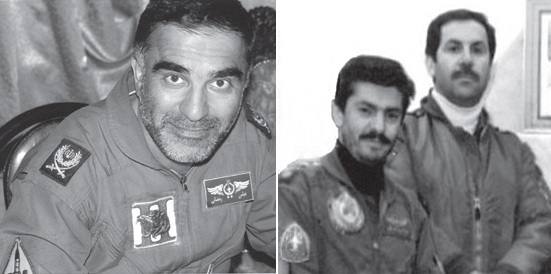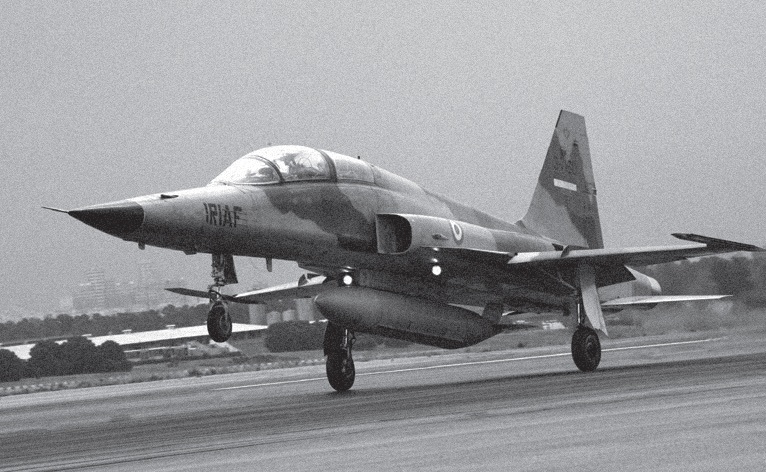Air Raid to Al-Waleed (17)
The Story of Demolishing Fighters and the Equipment in Al-Waleed Triple Military Bases Known as H-3
2016-5-1
Air Raid to Al-Waleed (H-3)
The Story of Demolishing Fighters and the Equipment in Al-Waleed Triple Military Bases Known as H-3
By: Brigadier General Ahmad Mehrnia
Tehran, Sooreh Mehr Publications Company
2010 (Persian Version)
Translated by: Zahra Hosseinian
The final operation
When all were asleep, the telephone of Captain Ibrahim Ghorbani[1] and First Lt. Abbas Ramazani’s ring: ‘hello, I phone from command post. Sir, it’s been ordered to come promptly!’

From right: Second Brigadier General Yadollah Rastegarfar, Col. Ibrahim Ghorbani, and Second Brigadier General Abbas Ramezani (2005).
An hour later, First Lt. Ali A’alizadeh is conveyed to be present at the command post by phone. At about six o’clock in the morning, two pilots of F-5 aircrafts are entered in command post of Tabriz air base. After a warm greeting, operations deputy of base, Major Yadollah Rastegarfar, ordered them to fly to check the weather conditions above the Lake Uremia, and report it to the base as soon as possible.
According to the log book of Second Brigadier General pilot Abbas Ramezani, a two-cabin F-5 aircraft piloted by Ibrahim Ghorbani, along with him in the rear cabin, leave the base runway aiming to go to the aircrafts refueling area, in the first few minutes of sunrise. Their mission is to ensure of good weather in the region, to inhibit spending the exorbitant costs of mission cancellation of a group of ten F-4 aircrafts and other flights associated with it. They have been dispatched to see the weather of region with their own eyes practically and to report to the base, so taking-off of phantoms to be co-ordinated. According to Amir Ramezani statement, the weather of that day was really great and he immediately transmitted a coded report.

Taking-off of (two-cabin) F-5 aircraft
On the other hand, the pilots and co-pilots, who should participate in the operations, gathered in the brief room at 7:00 AM. There is lots of hubbub. The noise of chairs and tables, which are moved and dragged about, has been combined with the noise of pilots’ discussion about the mission, which still don’t know precisely where it is and what is its quality. Since an hour before, in the other room, two experienced pilots are calculating distance and fuel consumption and designing the map of source rout to the destination to ensure that firstly the crisis of fuel shortages won’t come up in the mission and also they will have suitable locations for matching with navigation system.
Finally, all come together. Colonel Golchin and Baratpour, who are busy doing the last measures and co-ordination in the command post, head to brief room. In salute, all participants stand at attention. Golchin ordered: ‘at ease!’ and all sit down. After recitation of some verses of Holy Quran, the brief begins with a comprehensive report about the status of the enemy's defensive condition and bases close to the flight rout, which is presented by operations intelligence officer of base. Meteorologist officer report the good general weather situation. With the permission of base commander, leader scrupulously and carefully explain all the essential details of mission for pilots, from taking individual flight equipment to apparent check of aircrafts and their ammunition, taking-off, striking the target, and returning to country. One or two questions to be raised and he would answer them. The most important question is the reason of operations, but the possibility of its leaking out and its risk is very high! However, the threat exists and is heavy, but there is no remedy and the enemy must be deceived by surprise and new tactics. Since the northern route of Iraq is mountainous and has a special geographical condition, the only serious threat is the possibility of enemy’s observers, who may be present in the highlands and report the presence of flight group. In this case, fighters of Iraqi air force take off from the nearest bases and stop them. Now that we referred to the brief of information and threat, it is good to quote a memory of Amir Second Brigadier General pilot Seyyed Esmail Mousavi:
"The city of Khorramshar was falling. My mission was to go to Dezful and along with other colleagues support forces that were establishing and forming in the region. Although the city was occupied by the invaders and mad us sad, as soon as I arrived, but we were sure that it will be returned back to the embrace of the motherland very soon with relentless combat of all people, especially the army. I did two or three air cover flight and escort and got familiarize well with the situation. On November 3rd 1978, I was summoned to the command post of base to carry out an important mission. After attending in the command post, the situation of target, that is the camp location of one of Iraqi army divisions in Chenaneh district, was introduced. I noticed a very strong defense group of several cannons and missiles, especially SA-6 which is considered as one of the most dangerous threat for aircrafts at low and medium altitude, have been marked by different pins with colored-plastic-butts on the map and around the camp, when related officer was briefing in the presence of then commander of base. As an experienced pilot, quickly I reviewed in my mind the attack rout and tactics, and saw the amount of risk is more than the importance of target in my view. Therefore, I addressed the commander: "Sir, with this strong and widespread defense, it is advisable the operations to be implemented; the probability of receiving a blow and the loss of aircrafts and pilots is above 90 percent. Apparently the value of target was more for him, he calmly went to the map and got out marks of some SA-6 missiles around the target and said: ‘Now, you are a load off your mind. There are no missiles anymore and you can surely do your job.’ Although his act was apparently funny, but I found that the effect of the operations on the battlefield must be very important. Then, I saluted and along with my colleague, First Lt. pilot Mohammed Tayyebi, did preliminaries and flew. An hour later, the Army camp and the guys, who were present around it, had been damaged seriously! Fortunately, no bad thing happened and we returned safely to the base."
To be continued…
[1]. After retirement, Ghorbani passed away on September 5th 2006 in a car accident in the road of Mianeh-Tabriz. God rest his soul
Number of Visits: 4668








The latest
Most visited
A section of the memories of a freed Iranian prisoner; Mohsen Bakhshi
Programs of New Year HolidaysWithout blooming, without flowers, without greenery and without a table for Haft-sin , another spring has been arrived. Spring came to the camp without bringing freshness and the first days of New Year began in this camp. We were unaware of the plans that old friends had in this camp when Eid (New Year) came.
Attack on Halabcheh narrated
With wet saliva, we are having the lunch which that loving Isfahani man gave us from the back of his van when he said goodbye in the city entrance. Adaspolo [lentils with rice] with yoghurt! We were just started having it when the plane dives, we go down and shelter behind the runnel, and a few moments later, when the plane raises up, we also raise our heads, and while eating, we see the high sides ...The Arab People Committee
Another event that happened in Khuzestan Province and I followed up was the Arab People Committee. One day, we were informed that the Arabs had set up a committee special for themselves. At that time, I had less information about the Arab People , but knew well that dividing the people into Arab and non-Arab was a harmful measure.Kak-e Khak
The book “Kak-e Khak” is the narration of Mohammad Reza Ahmadi (Haj Habib), a commander in Kurdistan fronts. It has been published by Sarv-e Sorkh Publications in 500 copies in spring of 1400 (2022) and in 574 pages. Fatemeh Ghanbari has edited the book and the interview was conducted with the cooperation of Hossein Zahmatkesh.

